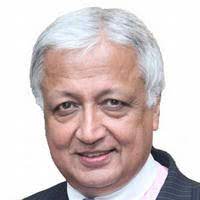

 Deepak Vohra
Deepak Vohra
As the world keeps a razor focus on Afghanistan, and there was a suicide bomb explosion at Kabul airport, there is trouble brewing in Pakistan. The Taliban have seized control of Kabul, got into bed with the United States, reinforced the ultra-radical Tehreek-e-Taliban Pakistan, and after “liberating” Afghanistan will now favour China and Pakistan with their unwelcome attention.
The Taliban have enough state-of-the-art American weaponry to cause mayhem in Pakistan. This is the only logical explanation for what is happening in Afghanistan, and why America left behind so much of its ultra-modern weaponry.
If some of it shows up in Kashmir via Pakistan, America will say “sorry buddy, we shall investigate.”
In the 1980s, President Zia ul-Haq trained and equipped the Mujahedeen. China provided the bulk of the weapons and the USA and Saudi Arabia paid for it.
Zia’s shortsighted strategy was to keep the pot simmering in Afghanistan (and continue to milk the West), not to let it boil over by encouraging the Mujahideen to attack the USSR proper, and provoke a retaliatory Soviet attack on Pakistan.
Following the Soviet withdrawal in 1989 a fellow called Hamid Gul offered Afghanistan to Benazir Bhutto on a platter, by sending thousands of Mujahedeen stiffened by Pakistani troops (and moving as a conventional army) to capture Jalalabad, make it the provisional capital of their favorite Mujahedeen Commander, the mercurial and treacherous Gulbuddin Hekmatyar, gain international recognition, and then slowly take over Afghanistan.
The Americans were not happy, fearing that Hekmatyar might become another Khomeini.
The Soviet trained and equipped Afghan army fought back splendidly, and several warring Mujahedeen factions joined them to repel the invaders.
The battle proved that the Afghan army could fight without Soviet help, and the morale of the mujahideen involved in the attack slumped.
As Pakistani soldiers’ bodies came back, Hamid Gul was sacked and in 2015 did the world a favour – he died but his dangerous legacy lives on among Pakistan's conservative sections, right-wing journalists, the madrassa clerics and students, and a powerful faction of the Pakistani army.
The Pakistani establishment modifies only the appearance but does not change the substance of its script. The Pakistani promises sound just too good to be true.
When Pakistan tried to control the battle for Jalalabad, a Mujahideen commander famously asked: "How is that we Afghans, who never lost a war, must take military instructions from the Pakistanis, who never won one?"
Today, the ultra-radical Tehreek e Taliban Pakistan created and supported by the Afghan Taliban is chafing at the bit and wants to capture Pakistan through terrorism. Hundreds of its fighters, among them many Al Qaeda members, are among the prisoners released from Afghan jails as part of the US-Taliban deal.
In pursuit of its strategic depth Pakistan’s military-jihadist combine has churned out thousands of human killing machines programmed to exterminate the Shia, the Ahmedias and non-Muslims.
There never was any indication that the Pakistani state was willing or even interested in decommissioning its jihadist assets. There are too many Talibans running around. Frankenstein’s monster has come back to devour the doctor.
Just before Pakistan put its weight behind the Taliban after failing to impose its Pashtun favourite Gulbudin Hikmatyar in the Afghan civil war (1992-1994), there was a flurry of activity involving invitations to Ahmed Shah Massoud and Rashid Dostum to Islamabad. The Americans were not happy, fearing that Hekmatyar might become another Khomeini.
The Soviet trained and equipped Afghan army fought back splendidly, and several warring Mujahedeen factions joined them to repel the invaders going to accept a fellow riding a Pakistani tank. The battle proved that the Afghan army could fight without Soviet help, and the morale of the mujahideen involved in the attack slumped.
As Pakistani soldiers’ bodies began to come back, Hamid Gul was sacked and in 2015 did the world a favour – he died but his dangerous legacy lives on among Pakistan's conservative sections, right-wing journalists, the madrassa clerics and students, and a powerful faction of the Pakistani army.
The Pakistani establishment modifies only the appearance but does not change the substance of its script. The Pakistani promises sound just too good to be true.
When Pakistan tried to control the battle for Jalalabad in 1989, a Mujahideen commander famously asked: "How is that we Afghans, who never lost a war, must take military instructions from the Pakistanis, who never won one?"
Today, the ultra-radical Tehreek e Taliban Pakistan created and supported by the Afghan Taliban is chafing at the bit and wants to capture Pakistan through terrorism. Hundreds of its fighters, among them many Al Qaeda members, are among the prisoners released from Afghan jails as part of the US-Taliban deal.
In pursuit of its strategic depth Pakistan’s military-jihadist combine has churned out thousands of human killing machines programmed to exterminate the Shia, the Ahmediyas and non-Muslims.
There never was any indication that the Pakistani state was willing or even interested in decommissioning its jihadist assets. There are too many Talibans running around. Frankenstein’s monster has come back to devour the doctor. In 2021, the Americans have left. The mice will play while the cat is away but the dance is orchestrated by the cat. Like an ostrich with its head buried in the sands of Balochistan, Islamabad foolishly hopes to divert global attention through cricket.
Imran Khan Niazi, who loves Jihadis of every hue, falls consistently for the dangerous delusion that, in a bad position, he could always conjure up some issue to extricate him from his difficulties. Pakistan, obsessively, compulsively, must see everything through the prism of India. If we trip over a stone, Pakistan will try to trip twice to show that it is one up on India.
When India abrogated article 370 to regularize the status of Jammu and Kashmir within the great Indian family, Pakistan rushed to hold elections in Gilgit-Baltistan in 2020 and in Pakistan Occupied Kashmir in mid-2021 to absorb these regions into Pakistan (abandoning the old fiction about these being ‘disputed areas.”)
In 2011, the Indian army and the Government of Jammu and Kashmir started the spectacularly popular Kashmir Premier League on the T-20 pattern as part of Operation Sadbhavana.All 10 districts participated with gusto and competed for generous cash awards. The teams had evocative names like Shopian Super Kings, Budgam Badshahs, Ganderbal Gladiators, Anantnag Arsenals, Srinagar Shahjahans. The latest matches were held in July 2021.
10 years later, Pakistan, has launched its newest antic – Kashmir Premier Cricket League. Next will be the National Pakistan Jihad Championship, between two teams led respectively by Syed Salahuddin and Hafiz Saeed. The winners will not have to wait till Jannat to get their 70 houris. The losers will be sent to Xinjiang.
Pakistan is trapped in a broken time machine, that seems constantly to regress. This latest nonsense about the Kashmir Premier League with some worn out has-been cricket players, and sponsored by a shady US-based company, is another example of unlimited lunacy, of immaturity at its most immature! Do the foreign players realize that they will never play in India again? Not that anyone in India wants them.
At least one of the Kashmir Premier League players, Herschelle Gibbs, was once fined along with several teammates for smoking marijuana during a tour of the West Indies.He will be quite comfortable in Pakistan, as we hear stories that one of that benighted nation’s top leaders is a drug addict. Most notoriously, Gibbs was involved in the match fixing affair with former captain Hansie Cronje, who offered him $15,000 to score "less than 20 in the 5th One-Day International of a series in India. He was banned for six months. In January 2007, it was announced that Gibbs, a Cape Coloured himself would face a disciplinary panel after making racist comments during the 1st Test against Pakistan. His words had been picked up on the stump microphone saying remarks such as "go back to the zoo" and swearing to the Pakistani players and as a result heard across the world. Gibbs married his girlfriend in St Kitts and Nevis in June 2007, and said that “I’d like to maybe make another world cup if I can. My body is still good, my mind is fresh and I’m still very hungry.” Was that an admission of his lust for lucre? They divorced soon afterwards.
The Pakistan Cricket Board reportedly expressed its displeasure over reports that the Board of Control for Cricket in India (the richest in the world) had called multiple ICC Members and forced them to withdraw their retired cricketers from the Kashmir Premier League.
What did Pakistan expect? That India would honour the sorry fellows who played in a controversial tournament? And then nature intervened. Massive floods in Pakistan Occupied Kashmir generated uncertainty. The Delta variant of the Chinese virus rampaging through the world (and Pakistan is still a part of this world) will make things more difficult. Bereft of new initiatives on Kashmir, since it had been consistently stymied, Islamabad was flailing about for fresh ideas.
Some joker (probably based overseas) suggested cricket in Kashmir, a few Kashmiri origin busybodies in England and elsewhere applauded, the army-backed establishment lapped it up, and the aam admi (crushed under a collapsing economy) will pick up the tab. We work through quiet diplomacy that is far more effective than megaphone declarations. That strange looking fellow with a oh-so-British accent who claims to be Pakistan’s Foreign Minister told a Japanese newspaper in end-May 2021 that Pakistan’s priorities had changed. He did not say that cricket in Kashmir is Pakistan’s new priority and that it will spend all its remaining money on it.
This issue is an obscene joke on the people of Kashmir, who have suffered for at least two generations from Pakistani terrorism. It is a prime example of Hanlon’s razor: a rule of thumb that states "never attribute to malice that which is adequately explained by stupidity.” With domestic political instability, a cratering economy, Chinese overlordship and international isolation, Pakistan’s Kashmir Premier League is the clearest example of national hit-wicket.
The region it belongs to is in deep turmoil. Afghanistan is boiling, Iran has resumed its nuclear business, China is calling in its IOUs. Chinese workers are being killed in Balochistan and Khyber Pakhtunkhwa.
In his six months in office, Joe Biden has ignored Pakistan, once America’s frontline ally in the war on terror, prompting Imran Khan to write a signed piece in The Washington Post in July begging for attention (Khan did not endear himself to Washington by claiming that the US military had created a mess in Afghanistan).
As the Taliban swept across Afghanistan, Pakistan’s role has come under increasing global scrutiny. The Financial Action Task Force is breathing down Pakistan’s creaking neck. And bowling Pakistan out consistently is China.
In Kashmir, Niazi tried to play cricket, But he found himself trapped in a thicket. He switched to PingPong. He got it all wrong again, and was out "hit wicket."
(Deepak Vohra is a senior diplomat, special Advisor to Prime Minister on Lesotho, South Sudan and Guinea-Bissau and Special Advisor to Ladakh Autonomous Hill Development Councils, Leh and Kargil)
